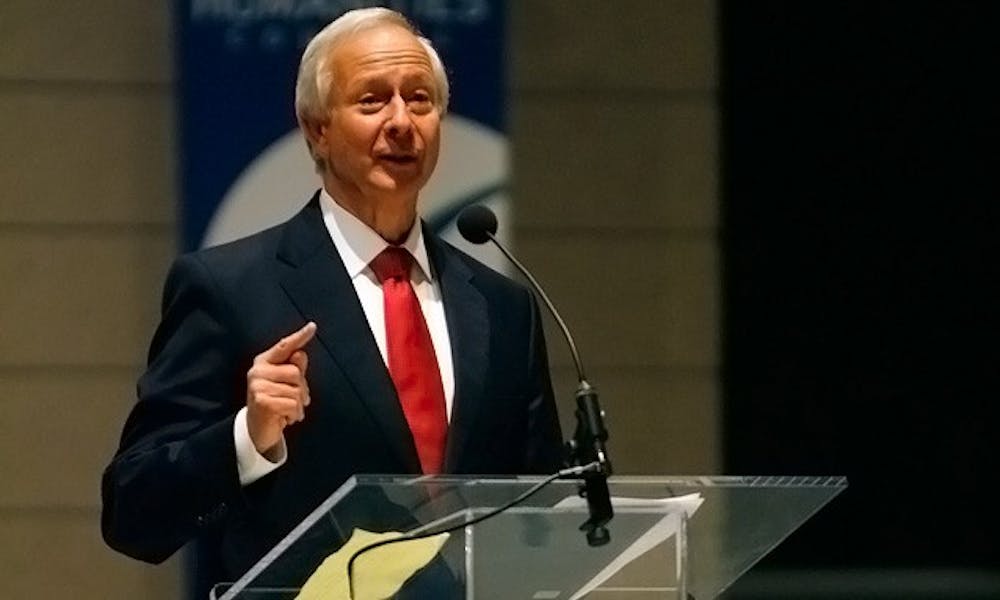Historical and literary reflection on the past is necessary for a prosperous future, several prominent scholars said at the annual Caldwell Lecture Friday.
Members of the Duke community among others from across the state gathered in the Nasher Museum of Art in support and celebration of the humanities. The North Carolina Humanities Council, a nonprofit and affiliate of the National Endowment for the Humanities, presented several awards including the 2011 John Tyler Caldwell Award for the Humanities, which was given to Rep. David Price, D-N.C. The event celebrated the humanities’ role in preserving history and culture.
“Humanities are not a specialized taste, they are the root of our most fundamental human consciousness,” said President Richard Brodhead, who delivered the Caldwell Lecture prior to the award presentation. “Without the humanities, we would have little idea where we came from and no idea where we might be going.”
Thomas Ross, president of the University of North Carolina system, presented Price—an author and former Duke political science and public policy professor—with the Caldwell Award for his work with national humanities causes. In 2004, Price founded the Congressional Humanities Caucus, which provides a forum for Congress to engage with the humanities and ensure the their vitality and prevalence. Price was also instrumental in the creation of the National Commission of Humanities and Social Sciences earlier this year, Ross said. Brodhead serves as the co-chair of the commission.
“[Price] is a vocal champion for the arts and humanities,” Ross said “He has proved the value of the humanities to our civil society,”
The award presented to Price is in honor of John Caldwell, the former chancellor of North Carolina State University and founder of the Humanities Council. Former Caldwell laureates include renowned author Reynolds Price and respected civil rights leader John Hope Franklin, both deceased and former Duke professors.
“John Tyler Caldwell was a man of many talents,” Ross said. “Congressman David Price is a man crafted from the same mold. He embodies so well the traits and commitment this award was created to recognize.”
After accepting the award, Price spoke of his personal relationship with Caldwell as well as his personal connections and insights to the humanities.
“I have the highest respect for Caldwell as a leader... and a warm and engaging human being,” Price said. “The humanities can illuminate our personal lives [as well as] our shared histories.”
In his lecture, Brodhead stressed the importance of the humanities in defining culture, noting his own study of mid-to-late 19th century author and political activist Charles Chesnutt, who grew up in Fayetteville, N.C. He discussed some of Chesnutt’s ideas, particularly his theory on the importance and cost of education.
“The less you think you can afford [education], the more you probably need it,” Brodhead read from Chesnutt’s journal, which he transcribed.
Brodhead added that these values still hold true in today’s society.
“The humanities aren’t a luxury to be enjoyed by those with high discretionary incomes,” Brodhead said. “The humanities are fundamental to our humanity.... As access to the humanities weakens, you pay all kinds of costs.”
Audience member Elizabeth Woodman, executive director of Eno Publishers in Hillsborough, N.C., said Brodhead’s lecture was an amazing tribute to the humanities and what they represent.
The 2011 Linda Flowers Literary Award—an award given to a writer whose work explores problems in lives that have been shaped by North Carolina—was presented to Nancy Taylor, a member of the North Carolina Humanities Council from 1992 to 1998.
The 2011 Harlan Joel Gradin Award for Excellence in the Public Humanities, which recognizes the public program with the furthest-reaching impact in the humanities, was given to Gaston County Public Library’s project “Standing on a Box: Lewis Hine’s National Child Labor Committee Photography in Gaston County, 1908.”
Some audience members noted the widespread importance of this event.
“Anybody whose appreciation and understanding of the humanities was not revived could not have been listening because this was such an annunciation of the importance of the humanities to our state and to our civilization,” said Laurel Sneed, a Road Scholar for the North Carolina Humanities Council.
Executive Director Shelly Crisp said the council’s mission is to transform lives by advocating life-long learning and thoughtful dialogue in North Carolina.
“This event celebrates the work of those who have made it their challenge that people across North Carolina reflect on their time in this place and understand their connection to history,” Crisp said.
Get The Chronicle straight to your inbox
Signup for our weekly newsletter. Cancel at any time.

